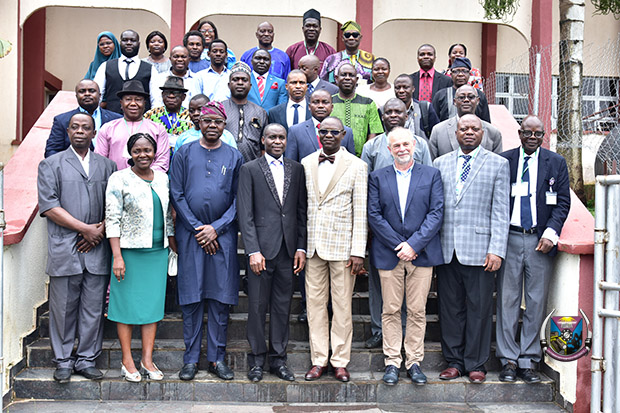

The Head of Service, Ondo State, Pastor Kayode Ogundele FCIPM, has said that in today's fast-paced and complex world, organizations, whether for profit or non-profit, depend on the skillful engagement, utilization and development of the human resource component to achieve their set objectives. Hence, the main objective of capacity building is to continue to increase the knowledge management of employees with the resulting measurable impact on corporate productivity.He stated this while delivering the First Keynote Lecture at the 2023 Alexander von Humboldt Kolleg sponsored by Alexander von Humboldt Foundation/Stiftung, Germany with the Theme “Research and Capacity Building for Agricultural Industrialized Economy of Sub-Saharan Africa” held at the Obafemi Awolowo Auditorium of the Federal University of Technology Akure on the 6th of June 2023.
Speaking on the topic exploring the relationship between capacity building and productivity, Pastor Ogundele said without capacity building and research, agriculture will remain at a subsistence level which will eventually culminate in food insecurity. These activities in turn enhance the productivity of its manpower and its ability not only to cope with emerging issues but have competitive advantage over others in the same industry. According to him survival of most corporate organizations is essentially dependent on acquired and developed transferable skills and experience of their employees. The employees are thus expected to develop along with the dynamism of their working environment and in response to rapidly growing competition.
He defined Capacity building as the systematic process of developing a workforce as well as creating an enabling environment that is conducive to learning, professional growth and innovation adding that the goal of capacity building is to ensure that individuals working in an organization have the necessary skills, competencies, knowledge and abilities to carry out their duties effectively. He highlighted the Challenges of Capacity Building in organization to include Limited Resources, Resistance to Change, Lack of top-down support, Inadequate monitoring and evaluation system.
The Keynote speaker said that there is a very strong correlation between capacity building and manpower productivity and that while it is very hard to measure the Return on Investment, efforts taken to improve the skills, attitude and knowledge of employees can have lasting and positive impact on the ability of the organization to deliver on its mandate leading to improved public services and by extension, higher Human Development Indices (HDIs).
Declaring the workshop open, the Vice Chancellor, Professor Adenike Oladiji represented by the Deputy Vice Chancellor, Academic Professor Taiwo Amos said the theme of the conference is apt in the current day realities of the myriads of challenges facing the economy of the nation. She said capacity building is the way forward for industrialization and a way of improving the economy of the nation.
She called on all stakeholders to rub minds and proffer solutions on ways the country can emerge from the financial quagmire that it has fallen into adding that with the current dwindling of crude oil prices in the international market, there has never been a time that Nigeria needs to diversify more than now. In the quest for diversification, agriculture seems to be the most sustainable way forward.
She commended the Dean School of Agriculture and Agricultural Technology and convener of the conferences, Professor Oluwatooyin Osundahunsi and members of the Local Organizing Committee for exceptional planning and organization.
In her welcome address the Dean, School of Agriculture and Agricultural Technology and convener of the conferences, Professor Oluwatooyin Osundahunsi, said capacity building will foster a sense of ownership and empowerment, so that community partners gain greater control of their future development. According to her this is inevitable, given the current challenge faced by the country because of the mono-economy nature of Nigeria, being dependent on crude petroleum oil. She said “The population of Nigeria as an emerging economy which is put at 200 million calls for urgent attention it is therefore imperative to examine the challenges facing the nation and proffer solution in a sustainable manner to ensure food security in Nigeria. Without capacity building and research, agriculture will remain at a subsistence level which will eventually culminate in food insecurity.”
Professor Osundahunsi pointed out that Nigeria needs to produce enough food to cater for her growing population and also export to earn foreign exchange and added that a sure way of achieving this is to leverage on the comparative advantage of good weather and vast arable land that Nigeria has, to produce food for her population and also feed other nations.
She said that the objectives of the conference are to encourage adequate participation of youth especially girls in higher education to acquire required knowledge and skills in Agropreneur; promote better participation and transfer of innovative and current practices to students by instructors and teachers in Nigeria; and encourage non-governmental and governmental agencies to provide conducive environment and policies that will promote agricultural industrialization.
There was another Keynote Lecture by Prof. Dr Claus-Thomas Bock, Robert Koch Institut (RKI) Germany on Zoonotic Hepatitis E: A new challenge for public and Animal health.
Special guests and facilitators of the programme include Dr. Daniela Kneissl Head of Division, Africa and Middle East Representative of the Alexander von Humboldt Foundation, Professor Oluwatoyin A. Odeku Humboldt Ambassador Scientist in Nigeria, Alexander von Humboldt Foundation, Germany.Mr Olayato Aribo - Commissioner for Agriculture and Forestry, Ondo State. Professor Ogugua C. Aworh - (Humboldtian), Retired Professor of Food Science and Technology, University of Ibadan, Ibadan, Nigeria Professor Tayo N. Fagbemi - Director, Accreditation and Step B, , Federal University Technology, Akure,.Professor Olaposi I. Omotuyi - Director, Bogoro Research Centre, Afe Babalola University, Ado-Ekiti, and Professor Isaac Ore-Oluwa Aiyelaagbe - Department of Horticulture, Federal University of Agriculture Abeokuta, Nigeria.